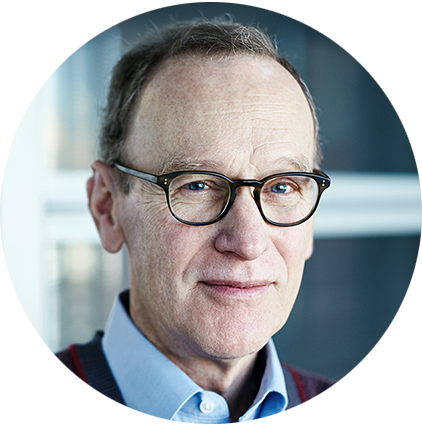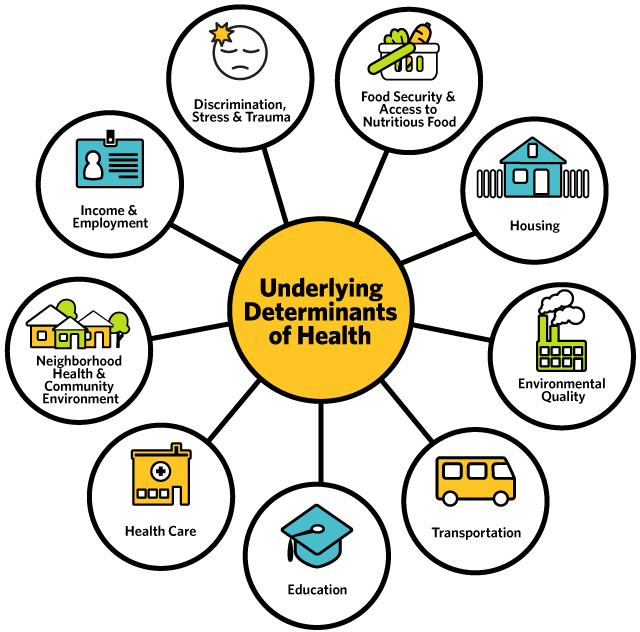 I don’t think I’m biased when I say that we have an exceptional organizational mission – “to improve the health and well-being of individuals and communities most in need” – to set as the North Star for our work. But how we think about the concepts of “health” and “well-being” greatly affects how we put this mission into action. These terms at first blush seem simple, but when looking at them through a broader lens we start to see how expansive they are. Health is more than just access to a doctor or hospital. By examining how the many elements that make up our lives affects our overall health and well-being, it becomes clear how broad our mission really is. Improving our health care system is certainly important to us, but so are issues like toxic stress, safe and stable housing, and food security. Our collective efforts are guided by the realization that the well-being of our communities can only truly be improved by also addressing the many underlying factors that shape our health over time.
I don’t think I’m biased when I say that we have an exceptional organizational mission – “to improve the health and well-being of individuals and communities most in need” – to set as the North Star for our work. But how we think about the concepts of “health” and “well-being” greatly affects how we put this mission into action. These terms at first blush seem simple, but when looking at them through a broader lens we start to see how expansive they are. Health is more than just access to a doctor or hospital. By examining how the many elements that make up our lives affects our overall health and well-being, it becomes clear how broad our mission really is. Improving our health care system is certainly important to us, but so are issues like toxic stress, safe and stable housing, and food security. Our collective efforts are guided by the realization that the well-being of our communities can only truly be improved by also addressing the many underlying factors that shape our health over time.
For many, the terms health and well-being imply medical care – diagnosis and treatment of specific illnesses by health professionals. Yet a moment’s reflection reveals a deeper, more complex idea, one grounded in the accumulation of experiences during a lifetime. We recognize that numerous factors, including family circumstances, education, and community environs influence everyone’s health. They affect everything from our behavior (e.g., smoking, eating, and physical activity), to our ultimate cause and time of death. These factors are often referred to as social determinants of health, but I prefer to use the more inclusive term underlying determinants of health. Think of them as upstream or contributing factors that can be altered to increase the downstream chances for healthier and more meaningful lives.
 Given the many factors that impact health and well-being, what roadmap do we use to chart our course to improve health in our communities? We begin with the understanding that medical care remains an important factor included in our work. That is reflected in the priority we give to helping people get health insurance coverage, increasing access to care, and strengthening behavioral health care as part of an integrated delivery system – three current focus areas. Indeed, many of our efforts are aimed at the goal of achieving universal access to affordable care, reflecting our view that our health care system is a crucial vehicle for improving health.
Given the many factors that impact health and well-being, what roadmap do we use to chart our course to improve health in our communities? We begin with the understanding that medical care remains an important factor included in our work. That is reflected in the priority we give to helping people get health insurance coverage, increasing access to care, and strengthening behavioral health care as part of an integrated delivery system – three current focus areas. Indeed, many of our efforts are aimed at the goal of achieving universal access to affordable care, reflecting our view that our health care system is a crucial vehicle for improving health.
But research over the past few decades has demonstrated that other factors have a greater effect on health than medical care. These underlying determinants of health, from food security to adequate housing to early childhood education, are inequitably distributed across communities. We all don’t begin life at the same starting line or have the same circumstances moving forward, and that makes all the difference in our relative health and well-being. This is why, despite advances in medical technology, the gap in life expectancy between the rich and the poor continues to widen. It is these circumstances that are the focus of our second goal – to reduce the inequities in underlying determinants of health. Our current and past work to promote healthy schools and healthy communities, strengthen our public health infrastructure, and reduce tobacco use all address underlying determinants of health. Efforts based on recommendations from the Ferguson Commission’s report on food insecurity and gun violence prevention reinforce the breadth of the Foundation’s work to reduce these inequities.
The two goals – universal access to affordable care and reducing inequities in underlying determinants of health – are interconnected. Strengthening health upstream reduces the needs of health care systems down the line. The Foundation’s work to strengthen leadership, advocacy, and policy apply to both goals. There are many fronts to work on improving health and well-being in Missouri, and our grantees’ work, whatever the specifics may be, contributes to our mission and these goals. Moving forward, we encourage our partners to think of health and well-being broadly, and to take advantage of our Opportunity Fund with these ideas in mind.


